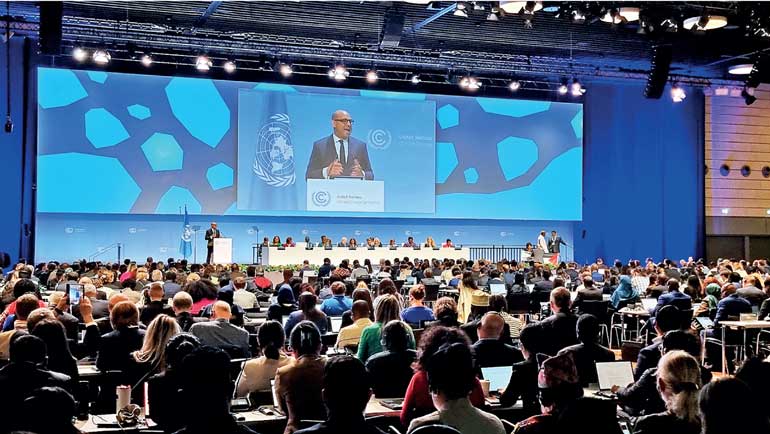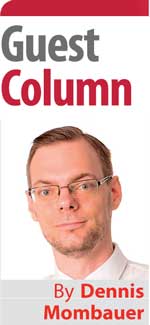Monday Feb 16, 2026
Monday Feb 16, 2026
Saturday, 15 June 2024 00:10 - - {{hitsCtrl.values.hits}}

SB60 brought together Parties to the UNFCCC and the Paris Agreement for two weeks of climate negotiations in Bonn, Germany
 From 3 to 13 June 2024, the 60th sessions of the Subsidiary Bodies (SB60) to the United Nations Framework Convention on Climate Change (UNFCCC) took place in Bonn, Germany. Like every year, these sessions mark the mid-point between two meetings of the Conference of the Parties (COP), the UNFCCC’s supreme decision-making body: in this case, COP28 in December 2023 and COP29 in November 2024. Accordingly, these mid-point negotiations play a key role to prepare for COP and lay the groundwork for decisions and outcomes at the end of the year based on the work of all Parties—including Sri Lanka—as well as non-Party stakeholders.
From 3 to 13 June 2024, the 60th sessions of the Subsidiary Bodies (SB60) to the United Nations Framework Convention on Climate Change (UNFCCC) took place in Bonn, Germany. Like every year, these sessions mark the mid-point between two meetings of the Conference of the Parties (COP), the UNFCCC’s supreme decision-making body: in this case, COP28 in December 2023 and COP29 in November 2024. Accordingly, these mid-point negotiations play a key role to prepare for COP and lay the groundwork for decisions and outcomes at the end of the year based on the work of all Parties—including Sri Lanka—as well as non-Party stakeholders.
The global climate agenda for 2024
There is a wide range of agenda items that are discussed as part of the multilateral climate change negotiations, spanning everything from emission reduction to finance and from capacity-building to science. At SB60 in Bonn, for example, a total of 34 groups were established to discuss various agenda areas as either informal consultations or contact groups, and a multitude of meetings and sessions took place throughout the two weeks.
For 2024, the following topics are among the most important and relevant for all countries involved in the process, particularly climate-vulnerable developing countries:
Climate finance
This year has been called “the year of climate finance,” and for good reason. For the first time in fifteen years, Parties must decide on a new headline number for the provision of climate finance, up from a floor of $ 100 billion per year. At COP15 in 2009, developed countries committed to jointly mobilising this amount from 2020 onwards up until 2025; the Paris Agreement then added an obligation to come up with a new—and higher—target before 2025, the new collective quantified goal on climate finance (NCQG).
At COP29, Parties will therefore need to decide on an amount to mobilise (the “quantum”), as well as many of the key parameters surrounding this overall goal, such as potential sub-goals for mitigation, adaptation, and/or loss and damage; the timeframe(s) of the goal; access features, modalities, and channels; quality of finance (for example, the degree of concessionality and the different instruments used); transparency arrangements in line with the provisions of the Paris Agreement and the Enhanced Transparency Framework; the removal of “disenablers” to climate finance; or potential additional sources of funding, such as taxes or levies.
Nationally Determined Contributions (NDCs)
All Parties are supposed to update and enhance their national commitments and ambition every five years, with the third cycle of NDCs coming up soon. These documents are central to achieving the goals of the Paris Agreement, as they represent each country’s efforts to reduce national emissions and keep global temperature rise below 1.5 degrees Celsius, as well as to adapt to the impacts of climate change.
Based on the agreed-upon timeframes, the new NDCs should be submitted by February 2025, nine months ahead of COP30, and ratchet up ambition as compared to the previous version. Besides ambition, there is also an opportunity to benefit from lessons learnt so far and either enhancing existing elements or incorporate new ones based on global best practices. However, developing countries will need finance and other means of implementation to effectively do this, which closely connects the NDC discussion to the NCQG and the availability of predictable, grant-based, and accessible funding.
Adaptation and loss and damage
With the UAE Framework for Global Climate Resilience, COP28 had a key outcome on the Global Goal on Adaptation and adaptation overall. As part of the framework, a work programme was launched to develop indicators for the targets outlined in the Framework, which include water, food, health, ecosystems and biodiversity, infrastructure and human settlements, livelihoods, and cultural heritage. Between now and COP30 at the end of 2025, indicator development is scheduled to take place, but it remains challenging due to the highly context-specific nature of adaptation.
On the loss and damage side, the main focus of the year might be on operationalising the existing institutions as quickly and efficiently as possible, particularly the Santiago Network and the Loss and Damage Fund. Both are now well on their way to becoming operational and provide concrete support to developing countries, including—for the first time in UNFCCC history—In the form of dedicated funding for loss and damage. However, in addition to becoming operational, the Fund will also need additional resources, with many expecting a second round of pledges at COP29 in Baku, Azerbaijan.
Other important areas of negotiation
The topics highlighted above are far from the only agenda items of relevance this year, and only serve to illustrate some of the headline areas from the viewpoint of developing countries. In addition to finance, NDCs, adaptation, and loss and damage, other key agenda items also include just transition (which has a newly established work programme around just transition pathways and promoting dialogue and knowledge-sharing); transparency (with Parties preparing their first biennial transparency reports this year under the Paris Agreement’s Enhanced Transparency Framework); technology transfer; gender; capacity-building; and many more.
As countries come out of SB60 with a clearer understanding of positions, convergences, and areas of contention, COP29 is already looming on the horizon. Time until then is limited, and there are critical decisions that must be made there, such as the one on an NCQG and the future of climate finance post-2025. There is an urgent need to scale up ambition and ensure the provision of necessary resources to developing countries to keep the goals of the UNFCCC and the Paris Agreement in reach through strong and collective global climate action.
(The writer works as Director: Research and Knowledge Management at SLYCAN Trust, a non-profit think tank based in Sri Lanka. His work focuses on climate change, adaptation, resilience, ecosystem conservation, just transition, human mobility, and a range of related issues. He holds a Master’s degree in Education from the University of Cologne, Germany and is a regular contributor to several international and local media outlets.)